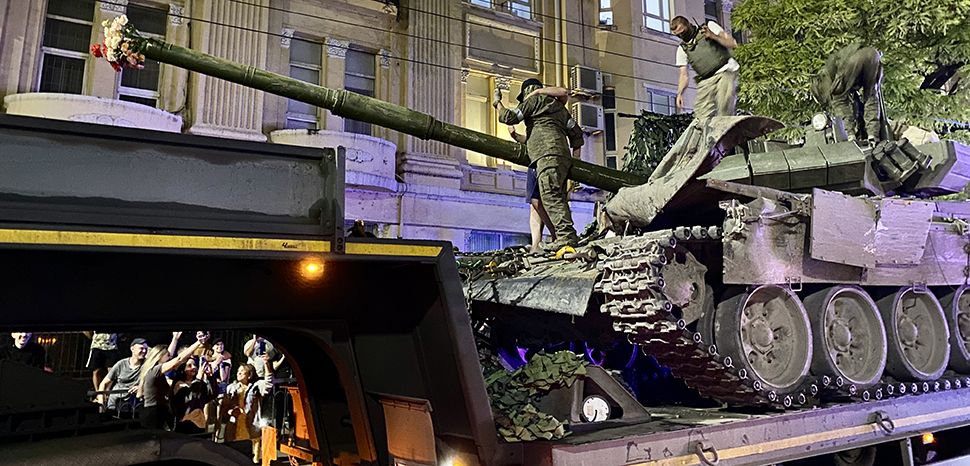Nicholas Chkhaidze

The death of Yevgeny Prigozhin and his right-hand man, Dmitry Utkin, can signify huge changes in the realm of private military companies (PMCs) in Russia. Particularly, there is a PMC that has been emerging and, now that the chain of command in Wagner has collapsed, at least temporarily, PMC Redut could and is willing to replace Wagner as a key instrument of the Kremlin’s hybrid and conventional warfare.
On top of that, the mercenary group is under the control of Russian Military Intelligence, which speaks volumes about Redut being completely loyal to the state institutions of Russia since they are also reliant on them for ammunition. Yet despite this, the group still has a significant degree of autonomy.
PMC Redut has a long history of serving the Kremlin and operating for Russia abroad. Having been created by the former employees of the Russian MOD, Foreign Intelligence Service, and the Russian Special Forces, who had significant experience in previous combat operations and wars, they have attracted the attention of the oligarchs, who wanted their corporations in Russia and abroad to be guarded and secured. The group has, along with Wagner, taken over the riches of practically every country they’ve gone to. Now with Prigozhin and Utkin gone, Redut will be the main PMC that will take over the security and military operations both abroad and in Ukraine.
Gennady Timchenko, a former KGB officer and a Russian oligarch close to Putin, who’s also known for holding enormous amounts of assets in his gas empire, is the one who benefits most from Redut’s security services, as Redut was created solely for defending the businesses of Timchenko. With Prigozhin’s rising influence in Russia and the Russian military, the elites decided to improve the capabilities of Redut to make it a potential competitor to the Wagner Group. Redut has also been actively recruiting fighters from Wagner, which is one of the reasons for their conflict.
After the mutiny in Russia two months ago, Vladimir Putin is trying to create a loyal ally and yet another instrument for plausible deniability, which vanished in the case of Wagner once Putin stated that they were being financed from the state budget of Russia. Furthermore, Redut, unlike Wagner, has recruited experienced fighters, who were also given a task to participate in the Kyiv Offensive and assassinate the President of Ukraine, Volodymyr Zelenskyy, at the beginning of Russia’s invasion of Ukraine.
With Redut having Gazprom PMC incorporate its operations under the Redut sphere of influence, along with their being able to set up a mercenary Cossack group, Vladimir Putin has gained a very loyal ally and an instrument of Russia’s hybrid warfare, which can serve as a tool for expanding the Kremlin’s influence in Africa as well. However, their lack of experience on the African continent can be problematic for the Kremlin to utilize them fully.
Wagner Group’s commanders have also accused their two high-ranking officials, one of them being Andrei Troshev, a man who was considered by Putin to be a replacement for Prigozhin as the head of Wagner Group, of defecting to PMC Redut. That is to say, on top of Prigozhin’s murder, the Kremlin has instilled paranoia into Wagner Group, in terms of the current leadership being suspicious about potential defectors and traitors, and that is a huge blow to the organization.
That doesn’t fundamentally imply the collapse of the Wagner Group, as allegedly, Anton Yelizarov, also known as Lotus, who’s a staunch Prigozhin loyalist and currently leading a group against Vladimir Putin, is the next in line to succeed Prigozhin as the head of Wagner Group. Thus, a man who perceives the Wagner Group not as a structure or an organization uniting mercenaries, but as an ideology, it is fair to say that if Yelizarov becomes Prigozhin’s successor, we’ll witness a struggle for influence between PMC Redut and the Wagner Group, a likely creation of a covert group seeking revenge for the murder of their godfather and patron, Prigozhin, and eventually, domestic destabilization, as loyalists in Russia have a habit of being quite zealous.
Despite what the Kremlin might be thinking, the pattern shows that the last time a wealthy businessman got direct access to the Kremlin, gained a significant amount of autonomy and trust, and utilized their very own PMC in combat operations, it fundamentally led to the mutiny of June 2023. In a state as deinstitutionalized as Russia, the possibility of PMC Redut and its leaders, Gennady Timchenko and General Vladimir Alexeyev being able to repeat the above scenario is not excluded altogether, and the Kremlin should remain wary going forward.
Even though Prigozhin was given security guarantees, unsurprisingly, he was still murdered, which signifies the cunning nature of Vladimir Putin, and that will result in Putin losing trust among the elites and even in his rather closed inner circle. And in Russia, where there’s a mafioso understanding of informal agreements, trust is a valued virtue. However, the decision was made, and it was executed to send a message, demonstrate power, and reaffirm Putin’s cracked legitimacy and undermined authority, which hasn’t fully recovered in the eyes of the elites. However, not making a move would have also been devastating for Putin, as Prigozhin was expanding his influence domestically and abroad. Therefore, with the rise of yet another private military company and the revenge-seeking Anton Yelizarov, no matter which decision Putin took on the day he assassinated Prigozhin, he was and still is stuck in Zugzwang.
No comments:
Post a Comment